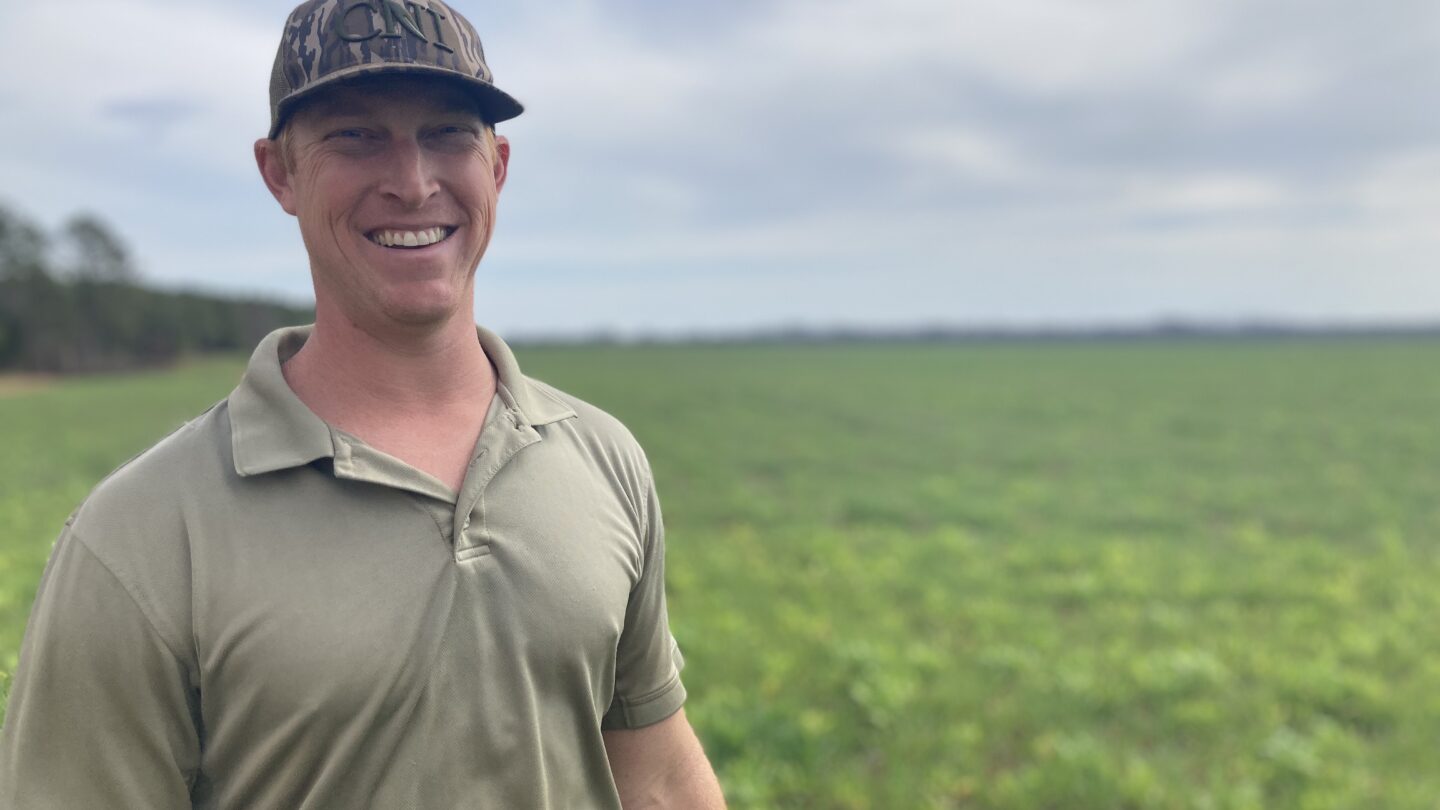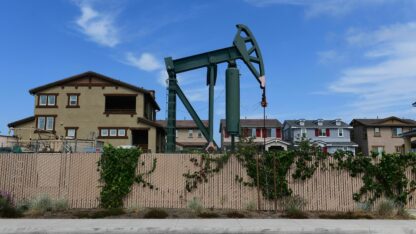Farming is the economic engine of southwest Georgia, an area dominated by fields of cotton and peanuts and orchards of pecan trees. Agriculture is also the biggest industry in the state. And what keeps all those farms going is water.
Most years, there’s plenty of it. But droughts happen, and they can happen fast.
“We’re seven to 10 days from a drought most any summer,” says Andy Payne, who grows cotton, corn, peanuts, citrus and row crops in Webster County.
Irrigation serves as a sort of insurance policy for farmers, but in a severely dry year, streams can dry up, leaving both crops and wildlife parched.
A project in southwest Georgia aims to alleviate the stress on water sources during droughts by working with farmers on solutions. The Georgia Flow Incentive Trust, or GA-FIT, is helping farmers drill new wells so that they can tap into different water sources during drought years, and so they can have a reliable water source while improving streamflows.
The project is also running an experimental auction for farmers to bid in. The prize for the winners is a commitment to not water some of their crops – or to water them less – when drought hits.
Research auction
The auction works through a web portal. “No shouting, just a lot of zeros and ones passing through cyberspace,” says Mark Masters, executive director of the Georgia Water Planning and Policy Center at Albany State University and one of the architects of the project.
Lower bids generally win in this auction, though other factors, including where the water comes from and what crop it’s going to, are also considered. The researchers are testing three different options for how farmers would be asked to reduce water use, but in general, if the state declares a drought, winning bidders would be paid to cut back.
“The thing is, in most years in southwest Georgia, we have ample water to irrigate and to do all the things we do, maintain a healthy ecosystem,” Masters says. “But we know that droughts will come.”
And so much comes down to timing: if the weather is dry when a crop most needs water, even small amounts of irrigation, which can still amount to thousands of gallons a minute, can make a big difference for farmers, he says.
Masters says an auction like this could be another way to help save water during the driest times. The funding for the project comes from the Woodruff Foundation. Researchers at the Nature Conservancy and the University of Delaware worked with the Water Planning and Policy Center staff to develop it.
The GA-FIT team is hoping to learn from this experiment about how farmers participate since everyone’s operation is a little bit different.
Payne says to figure out his bid, he factored in costs, including for irrigation, fuel, fertilizer and chemicals.
“The cost of operating funds, the cost of capital, the cost of everything is high,” he says. “We’re looking at maybe some thin margins, so we want to make sure we cover our costs. And that all goes into looking at how we participate.”
Riley Davis, a fourth-generation farmer in Terrell County who grows cotton, peanuts and corn, says when he first heard about the auction, he was leery of it.
“I mean, I don’t want to have an acre and do that and feel like I’m just not planting it,” Davis says.
So in the first year of the experiment, he bid a little high.
Davis says he gets the motivation behind it, though; it’s about taking care of the natural resources that farmers like him rely on.
“I mean, it’s going to come down to money, money, money, but for me, it’s more to it than that,” he says. “You got to look after the land.”
A tool in the toolbox
Georgia has held official auctions of this sort before, in the early 2000s. This research aims to improve on the concept. And, since it’s an experiment, it’s also narrower, focusing on a single watershed: farms in the Ichawaynochaway Creek basin.
“It’s a beautiful stream,” says Steve Golladay, an aquatic biologist at the Jones Center at Ichauway. He’s worked on this creek and studied the wildlife in it for three decades.
A lot of years, Ichawaynochaway Creek, which is a tributary of the Flint River, is a nice, swift-flowing stream – deep enough that Golladay says he can maneuver a research boat without a problem – but even in a normal summer, it can get low enough that a kayak would be tough going. During droughts, it’s worse. In 2012, the creek was dry enough to walk across.
The warming climate and increasing water use add to the pressure, Golladay says.
“We know that we have the potential to use sufficient water to dry up the stream,” says Golladay, who’s an advisor on the auction. “So we’re looking for tools to prevent that from ever happening.”
The auction, he says, is one of those tools.
‘Real wins’
This water has historically been tied up in controversy. For decades, Georgia, Florida and Alabama have argued over water. Florida has accused Georgia, including southwest Georgia farms, of using too much of it.
The fight escalated to the U.S. Supreme Court. Florida claimed Georgia’s water use was threatening the oysters, fisheries, and ecosystem of the Apalachicola Bay, and it was asking the court to limit how much water the state could use. The court ultimately sided with Georgia.
Getting past that case and focusing on projects like GA-FIT is a new era for water policy in the region, says Gordon Rogers, executive director of the environmental organization Flint Riverkeeper.
“Now the real wins are happening,” Rogers says. “For everybody – for Georgians, for Floridians.”
Rogers says his goals are for people to be able to swim, fish, and have Baptisms – even during droughts. He says the auction and other water projects in the area could bring those activities back into reach again by restoring flows to the Flint River.
“We need to be able to do all those things,” he says. “We used to do it.”
Masters says it’s also important for him to have farmers involved in developing water policy and for decisions to not only be made higher up – but also by the farmers themselves. With these auctions, which are voluntary, he says he’s seen them engage in a big way.
“We want to just make sure that we are as nimble as we can be protecting those farmers, protecting those streams,” he says.
Jimmy Webb, a cotton, corn and peanut farmer in Calhoun County, says he’d always rather have a crop in a field, rather than take it out of production. But he’s participating in the auction, too. He says he’s as efficient with water as he can be, and even so, he’s had years that were close calls – like that drought year of 2012, where even with irrigation, he was worried.
“We’re going to have times where it gets extremely dry,” Webb says. “The purpose of that auction is to keep enough water in the creek, but yet, keep me in business.”









